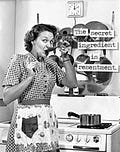Missed the homework assignment? Reading list post here.
References
“Gray hair is a crown of glory; it is gained in a righteous life.” Proverbs 16:31
The Free Press on defeating death (Substack)
Robert Conquest on a cabal of enemies… George was a little fast and loose with this comparison, because really Conquest says it about bureaucratic organizations, which certainly applies to orgs that champion causes, but may not as easily apply to a movement in the abstract such as feminism.
Eliza Mondegreen on Gender: A Wider Lens (YouTube)
Topic: The word “human”
Friedan on first-wave feminism
The feminists had only one model, one image, one vision, of a full and free human being: man. For until very recently, only men (though not all men) had the freedom and the education necessary to realize their full abilities, to pioneer and create and discover, and map new trails for future generations. Only men had the vote: the freedom to shape the major decisions of society. Only men had the freedom to love, and enjoy love, and decide for themselves in the eyes of their God the problems of right and wrong. Did women want these freedoms because they wanted to be men? Or did they want them because they also were human?
That this is what feminism was all about was seen symbolically by Henrik Ibsen. When he said in the play “A Doll’s House,” in 1879, that a woman was simply a human being, he struck a new note in literature. Thousands of women in middle-class Europe and America, in that Victorian time, saw themselves in Nora. And in 1960, almost a century later, millions of American housewives, who watched the play on television, also saw themselves as they heard Nora say: “… I believe that before all else I am a reasonable human being, just as you are.” (106-7)
Friedan on self-actualizing people
Professor Maslow found in his study that self-actualizing people invariably have a commitment, a sense of mission in life that makes them live in a very large human world, a frame of reference beyond privatism and preoccupation with the petty details of daily life. (342)
Smith on housework…
Like many women of my generation, I didn’t think housework, or child- and eldercare would be disproportionately loaded onto women by the time I reached middle age. The injustice of this had already been pointed out back in 1963, when Betty Friedan identified ‘the problem that has no name’. Resistance to a more equal distribution of domestic labour was, I was quite convinced, cohort-specific. Media representations of the so-called ‘mummy wars’ made it look like a battle between ageing traditionalists, who wanted women barefoot and pregnant, and young progressives, who believed we should be able to make the same choices as men. It didn’t cross my mind that men my age would end up wanting a housewife in all but name, too. I thought that the problem that had no name had been vanquished by the naming. … I didn’t realise that feminism is like housework, like all women’s work, requiring routine goings-over, constant maintenance, year after year. I couldn’t see how much my own prejudices about older women — the Universal Mummy class — informed my unrealistic expectations regarding my own future. I simply thought these older women would have sorted matters, quietly, invisibly, domestic equality materialising like freshly washed pants appearing in an underwear drawer. (96)
Smith again…
From an historical perspective, the sheer effort that men have put in to persuading women that we are morally and/or biologically pre-programmed to undertake dull, repetitive work behind closed doors for no pay whatsoever is staggering (it would have been less effort for them to just do the dishes themselves) (102).
Topic: Key statements
Friedan defines the mystique
The feminine mystique says that the highest value and the only commitment for women is the fulfillment of their own femininity. It says that the great mistake of Western culture, through most of its history, has been the undervaluation of this femininity. It says this femininity is so mysterious and intuitive and close to the creation and origin of life that man-made science may never be able to understand it. But however special and different, it is in no way inferior to the nature of man; it may even in certain respects be superior. The mistake, says the mystique, the root of women’s troubles in the past is that women envied men, women tried to be like men, instead of accepting their own nature, which can find fulfillment only in sexual passivity, male domination, and nurturing maternal love. (70)
Smith on hag hate
Right now we are experiencing a backlash against feminist gains, and middle-aged women form a perfect target for hostility… The ageist misogyny directed at middle-aged women today — or hag hate, as I have come to think of it — is insidious because it enables deeply regressive beliefs about what women should be (young, beautiful, feminine, fertile, fuckable) to be recast as progressive. There are those who will claim that it’s not middle-aged women who are the problem, just these middle-aged women, here, now, who are particularly troublesome. It’s regrettable, but Generation X women just so happen to fit a template which is every misogynist’s dream, while also possessing enough freedom to make the misogyny they do experience look like something they have chosen, either in return for other privileges or because they are simply too ignorant to understand how misogyny works. Older women, just by virtue of being older, are associated with a ‘more sexist’ past and thus appear complicit in a sexism which is on its way out. They are ‘dinosaurs’. Raging against them can feel like a break with the patriarchal past. The target of misogyny becomes an emblem for it. Get rid of her, and the problem is solved. (9)
Topic: Narratives of self-actualization
Friedan on women’s magazines
I sat for many days in the New York Public Library, going back through bound volumes of American women’s magazines for the last twenty years. I found a change in the image of the American woman, and in the boundaries of the woman’s world, as sharp and puzzling as the changes revealed in cores of ocean sediment.
In 1939, the heroines of women’s magazine stories were not always young, but in a certain sense they were younger than their fictional counterparts today. They were young in the same way that the American hero has always been young: they were New Women, creating with a gay determined spirit a new identity for women—a life of their own. There was an aura about them of becoming, of moving into a future that was going to be different from the past. The majority of heroines in the four major women’s magazines… were career women—happily, proudly, adventurously, attractively career women—who loved and were loved by men. And the spirit, courage, independence, determination —the strength of character they showed in their work as nurses, teachers, artists, actresses, copywriters, saleswomen—were part of their charm. There was a definite aura that their individuality was something to be admired, not unattractive to men, that men were drawn to them as much for their spirit and character as for their looks. (65-6)
Smith on why the waves (of feminism) never reach shore
If you study the way in which feminism is described using the wave metaphor, you will notice a curious thing has happened. Despite occasional rumblings about a fourth, or even a fifth, there hasn’t really been another wave after the third; instead, women once deemed to be third wave progress along a conveyor belt toward the past, whereupon they are granted second-wave status. In strictly chronological terms, the second wave of activism originated in the sixties, the third in the nineties, which would make me and other women approaching their fifties third-wavers. However, as Astrid Henry notes in her 2004 book, Not My Mother’s Sister, ‘while Generation X ages, the third wave remains young, unhinging the relationship between the two terms. It would appear, then, that “third wave” suggests a particular politics is the province of the young’. Whether or not it is an honour to age into second-wave status depends on your perspective. Having done none of the work, I’m rather taken with the idea of being able to shove my Girl Power T-shirt into the back of a drawer and claim responsibility for legislation that had nothing whatsoever to do with me. To others, such as the (at time of writing) 87,000 people favouriting a tweet which declares both feminism and Covid-19 to have ‘problematic second waves’, it might appear less flattering… Either way, I’m not a second-wave feminist. I’m just someone who isn’t allowed to be a third wave one any more because of what experience has done to my body and my perspective. (149)
Topic: Hyperbole and feminine erasure
Friedan compares housewives to victims of the Shoah
It is not an exaggeration to call the stagnating state of millions of American housewives a sickness, a disease in the shape of a progressively weaker core of human self that is being handed down to their sons and daughters at a time when the dehumanizing aspects of modern mass culture make it necessary for men and women to have a strong core of self, strong enough to retain human individuality through the frightening, unpredictable pressures of our changing environment. The strength of women is not the cause, but the cure for this sickness. Only when women are permitted to use their full strength, to grow to their full capacities, can the feminine mystique be shattered and the progressive dehumanization of their children be stopped. And most women can no longer use their full strength, grow to their full human capacity, as housewives.
It is urgent to understand how the very condition of being a housewife can create a sense of emptiness, non-existence, nothingness, in women. There are aspects of the housewife role that make it almost impossible for a woman of adult intelligence to retain a sense of human identity, the firm core of self or “I” without which a human being, man or woman, is not truly alive. For women of ability, in America today, I am convinced there is something about the housewife state itself that is dangerous. In a sense that is not as farfetched as it sounds, the women who “adjust” as housewives, who grow up wanting to be “just a housewife,” are in as much danger as the millions who walked to their own death in the concentration camps—and the millions more who refused to believe that the concentration camps existed. (325; bold ours)
Smith on feminism without femaleness
In Agewise, Margaret Morganroth Gullette associates a rise in ageism being positioned as a narrative of inevitable decline, set in opposition to moral and political progress narratives. I think there is a similar decline narrative tagged to femaleness, as female people are considered more worthless — sexually, reproductively and economically — than their male peers as they age… Mainstream feminism is, by contrast, a progress narrative. The movement that represents women goes forwards while actual women go backwards, moving even further from the liberated, evolved ideal the older they get. Hence the bizarre chronological fudges and definitional revisions which characterise modern feminism. What is often described as a tension between younger, liberal feminism and older, radical feminism often comes down to something else: the movement is deemed more worthy than those it represents. Feminism is not an idea, not a body; it’s not dragged down by the accumulation of flesh, relationships and compromise. The end point of this thinking sees femaleness in its entirety being treated as outdated. In a sketch for his Netflix special SuperNature, Ricky Gervais parodied tensions between trans activists and feminists by playing off ‘the old-fashioned women, the ones with wombs, those fucking dinosarus’ against ‘the new women’. Many found the sketch crass, but I think it captured a manifestation of misogyny that is real and has been emerging for quite some time. (147; bold ours)

















Women of a certain age